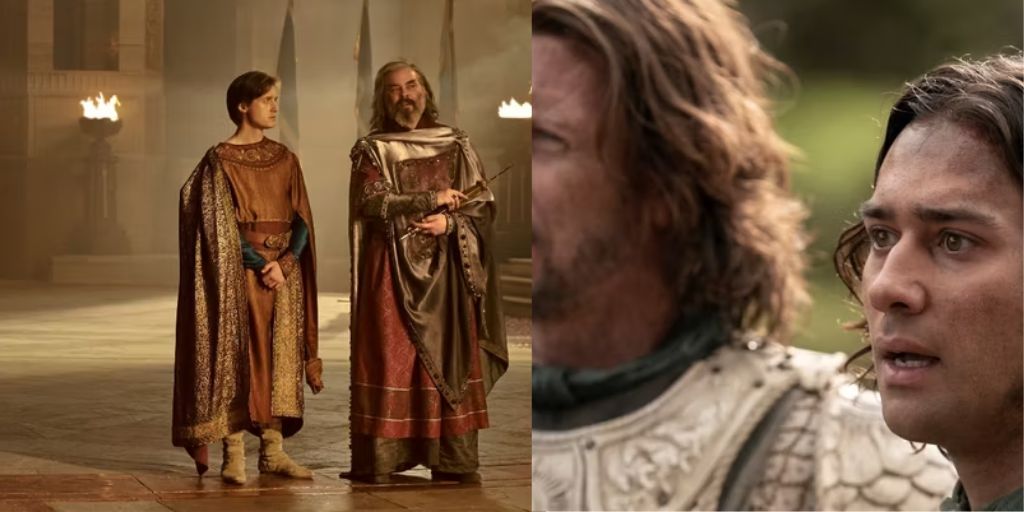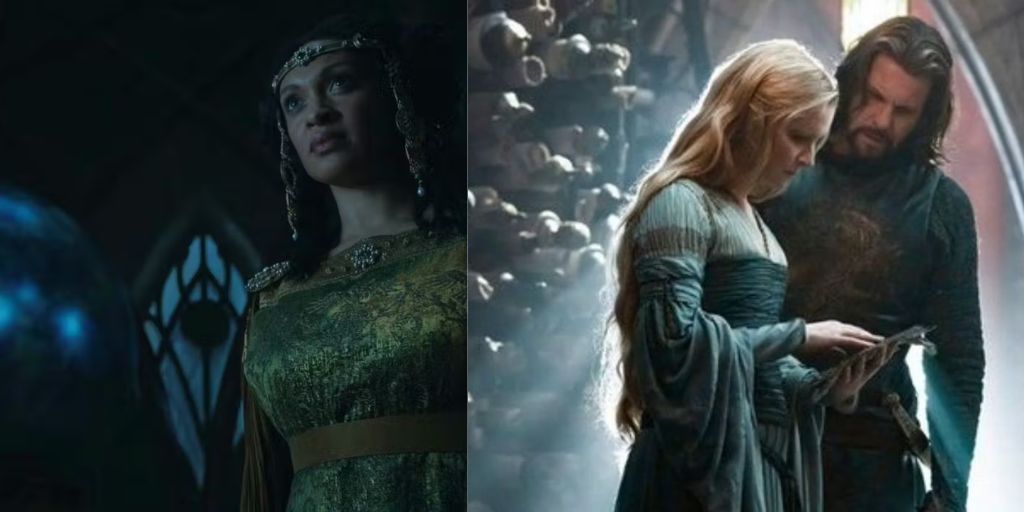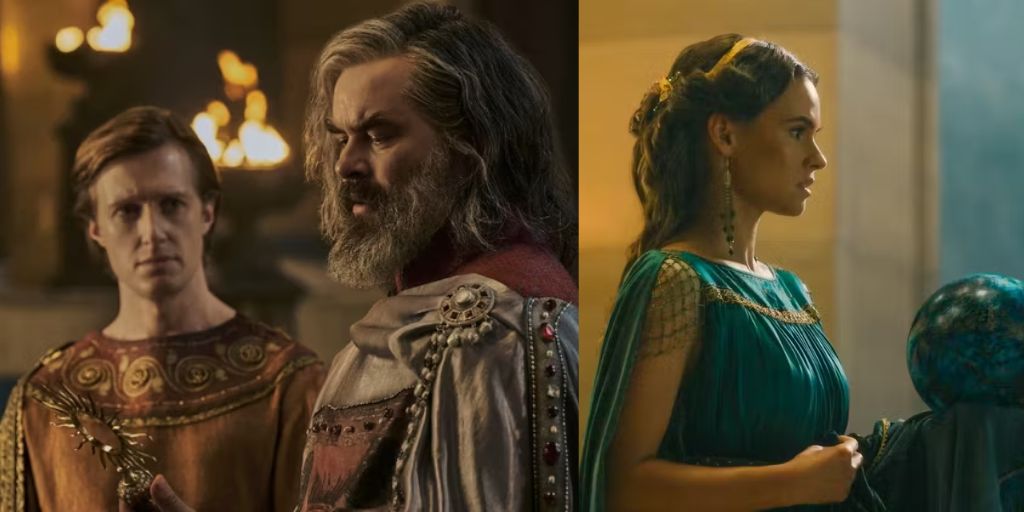An old rivalry is about to ignite in The Lord of the Rings: The Rings of Power. In Season 2, Episode 5, titled “Halls of Stone,” Ar-Pharazôn (played by Trystan Gravelle) speaks to his son, Kemen (Leon Wadham), about seeing the shores of Valinor from Númenor. His words are filled with bitterness.
He resents that Elves live forever in the Undying Lands, while Men must face their mortality. This growing dislike for Elves is spreading across Númenor, but why do the people of this island dislike Elves so much? They once fought together, so what changed?
Númenor’s History Is Linked to the Elves
Listening to Ar-Pharazôn’s harsh words about Elves, it seems surprising that Númenor’s origins are tied to them. In the third episode of The Rings of Power, titled “Adar,” we see Galadriel (Morfydd Clark) and Elendil (Lloyd Owen) showing Númenor’s archives.
They discover information about Elros, the first king of Númenor and the brother of Elrond (Robert Aramayo). Both Elros and Elrond are half-Elven, meaning they were given the choice by the Valar to live as either Elves or Men. Elros chose to be a Man, while Elrond chose to live as an Elf.
The relationship between Elves and Men dates back to long before Númenor’s founding. In the First Age, Elves and Men had good relations.
There were even two important couples from both races, Beren and Lúthien, and Tuor and Idril, from whom Elros and Elrond are descended. At that time, Middle-earth was larger and included the continent of Beleriand, where many Elves and Humans lived.
However, the First Age was also a time of constant battles between the Free Peoples of Middle-earth and Morgoth, the Dark Lord. Elves and Men often fought together but were only able to defeat Morgoth when the Valar left Valinor to join the fight.

This conflict, known as the War of Wrath, caused so much destruction that Erú Ilúvatar, the god-like creator of all in Tolkien’s world, decided to sink Beleriand, reshaping the geography of Middle-earth.
Rewards and Rivalries: The Changing Relationship Between Elves and Men
After the War of Wrath, both Elves and Men were rewarded for their bravery. The Elves, known as the Eldar, were allowed to return to the Undying Lands of Valinor. Meanwhile, the Humans who had helped fight Morgoth were called the Edain, and the Valar gave them the Isle of Elenna, where they founded the kingdom of Númenor.
The Edain were also blessed with longer lives and greater strength than other Humans. With their own kingdom and enhanced abilities, it seemed the Edain had everything they could wish for.
In the beginning, the people of Númenor kept close ties with the Elves, especially those from Eressëa in Valinor and from Middle-earth, like Gil-galad’s Elves in Lindon.
The Númenóreans learned much from them, including wisdom, craftsmanship, and knowledge about the world. Their friendship was considered valuable. Early Númenórean kings and their people were loyal to the Valar and continued to help Middle-earth in its fight against Sauron (Charlie Vickers).
But this did not last. As time passed, pride and corruption started to take over Númenor’s leaders and people. They began to envy the Elves’ immortality and resent their own mortality. Ar-Pharazôn’s bitter words in “Halls of Stone” reflect this growing tension.
The division between the Faithful, who remained loyal to the Valar and Elves, and the King’s Men, who envied and hated them, grew deeper. This schism became more pronounced after Ar-Pharazôn led Númenor in a war against Sauron and brought him to the island as a prisoner.
Sauron, however, soon manipulated Ar-Pharazôn and became his trusted advisor. Under Sauron’s influence, many Númenóreans began worshipping Morgoth, the first Dark Lord, further corrupting the island’s society.
Eventually, Ar-Pharazôn set his sights on Valinor, intending to conquer it and gain immortality. Erú Ilúvatar, seeing this as a threat, intervened once again.
He sank the Isle of Elenna, just as he had done with Beleriand, and reshaped the world to prevent Men from reaching Valinor. Before this event, the world of Arda (Middle-earth’s planet) was flat. Erú changed it into a sphere and separated the continent of Aman, where Valinor is located, from the rest of the world.
The Faithful’s Survival and the Elves’ Continued Role
After Ar-Pharazôn’s conversation with Kemen in The Rings of Power, we see Tar-Míriel (Cynthia Addai-Robinson) and Elendil discussing the visions revealed by the Palantir. Míriel has seen Númenor’s destruction many times, and she knows the island’s future is grim.
While she goes into seclusion, Elendil and the Faithful are labeled as outlaws. In Tolkien’s books, Elendil and his sons, Isildur (Maxim Baldry) and Anárion manage to escape Númenor during its fall, taking the Faithful with them. Guided by a storm sent by the Valar, they arrive safely in Middle-earth.

After losing their homeland, the Faithful rely on the Elves for assistance in Middle-earth. With their help, Elendil establishes the northern kingdom of Arnor, while Isildur and Anárion create the southern realm of Gondor.
By the time of the Third Age, most of the Edain are gone, and the Faithful’s descendants are known as the Dúnedain. Among them, the most famous is Aragorn (Viggo Mortensen), who is a direct descendant of Isildur, making him the rightful heir to both Arnor and Gondor.
Season 2 of The Rings of Power is streaming on Prime Video in the U.S., with new episodes available every Thursday.





